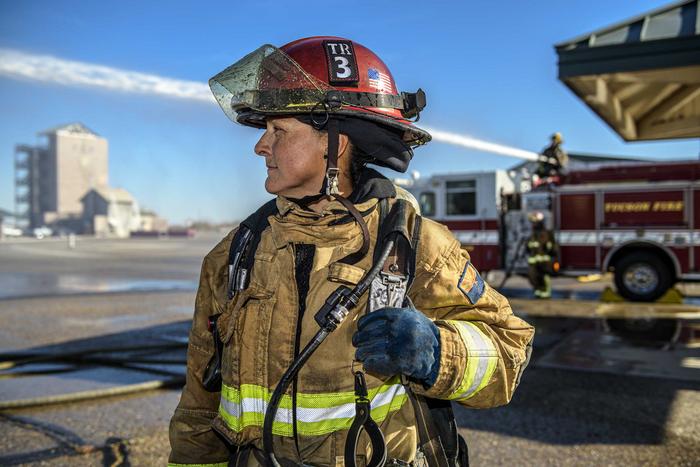A groundbreaking study conducted by researchers at the University of Arizona Mel and Enid Zuckerman College of Public Health has unveiled critical links between mental health and reproductive health in women firefighters. This intricate research adds a new layer of understanding to the impacts of high-stress occupations where exposure to traumatic events is prevalent, particularly among female firefighters. Their findings contribute significantly to the discourse surrounding occupational health and women’s health, specifically inhabiting the intersections of psychological well-being and physiological outcomes.
In their pursuit of evidence, the researchers, led by Michelle Valenti, a doctoral student specializing in epidemiology, took a comprehensive approach to analyze hormone levels in relation to documented mental health statuses. The study identified that clinical diagnoses of PTSD led to a significant 66% reduction in AMH levels, while anxiety correspondingly lowered levels by 33%. Such stark statistics reflect alarming trends, particularly in a profession traditionally dominated by males where mental health is often stigmatized.
The implications of reduced AMH levels are profound and multifaceted. For women firefighters striving to balance demanding careers with family planning, these findings signal a dire necessity to advocate for improved mental health resources. The association between lower AMH levels and heightened anxiety or PTSD implies that the very roles these women occupy could pose serious challenges to their reproductive choices and overall fertility.
Furthermore, the results of this study align with previous findings indicating that women firefighters generally present lower AMH levels compared to their non-firefighting counterparts; however, the underlying reasons had remained murky until now. The present inquiry illuminates potential pathways linking mental health struggles and decreased reproductive capabilities, establishing a foundational understanding from which further research can be developed.
As the occupational hazards experienced by firefighters extend beyond just the physical realm, the psychological toll can contribute to chronic conditions that may manifest in observable biological changes. The research highlights a vital need for fire departments to acknowledge the impact of not only the physical rigors of firefighting but also the ongoing emotional repercussions of their work. This nuanced understanding posits that psychological health interventions could be essential in supporting women’s reproductive health.
The findings of this study were articulated in the paper titled “Evaluating the Effect of Depression, Anxiety, and Post-Traumatic Stress Disorder on Anti-Müllerian Hormone Levels Among Women Firefighters,” recently published in the Journal of Women’s Health. By not only venturing into the realms of reproductive health literature but intertwining mental health considerations, this research urges stakeholders within firefighting services to genuinely integrate mental health programs within occupational health protocols.
As various organizations advocate for better workplace standards and mental health initiatives, these findings could stir profound changes. Fire departments that integrate wellness programs aimed at stress reduction and psychological resilience may find themselves enhancing the quality of life for their female firefighters, subsequently improving overall team effectiveness and morale.
Moreover, the comprehensive collaboration entailed in this research, including partnerships across various academic and firefighting institutions, enhances the credibility of the results. It underscores a community-focused approach to acknowledging and resolving the inquiries into reproductive health issues faced by women in high-stress professions. This study serves as a clarion call not just to individual factions within the industrial and health sectors but as a movement toward a broader recognition of women’s health.
The research findings resonate within the context of the larger Women Firefighter Study, part of the Fire Fighter Cancer Cohort Study, demonstrating a crucial commitment to women’s health in the line of duty. By understanding the unique challenges that female firefighters face, further studies can catalyze significant changes in public health policy and organizational practices.
Caitlin St. Clair, a captain with the Puget Sound Regional Fire Authority, noted the urgent need for scientific leverage in implementing stress reduction programs. Her assertion underscores the broader implications of the findings: effective intervention strategies could mitigate the adverse effects discovered in this critical study and promote healthier outcomes for women in firefighting roles.
In conclusion, the intersection of mental health and reproductive well-being highlights an often overlooked but essential facet of women’s health dilemmas in high-stress occupations. The urgent need for intervention strategies, along with increased mental health resources and support programs, will not only preserve women’s reproductive health but will also forge pathways to establish healthier futures both for individual firefighters and the communities they serve.
Through advocacy, research, and a commitment to transformation, the firefighting community can harness these findings to build a more supportive environment that acknowledges and addresses the holistic health needs of its members.
Subject of Research:
Women Firefighters’ Mental Health and Reproductive Health Correlation
Article Title:
Evaluating the Effect of Depression, Anxiety, and Post-Traumatic Stress Disorder on Anti-Müllerian Hormone Levels Among Women Firefighters
News Publication Date:
20-Dec-2024
Web References:
[Include specific URLs as applicable]
References:
[Include specific citations as applicable]
Image Credits:
Credit: Photo by Kris Hanning, U of A Health Sciences Office of Communications
Keywords:
Anxiety, Post-traumatic stress disorder, Cohort studies, Public health, Hormones, Psychological stress, Disease intervention, Human fertilization.
Tags: Anti-Müllerian HormoneAnxiety DisordersCohort studyMental Health StigmaOccupational StressOvarian ReservePTSDPublic Health ResearchReproductive HealthWomen FirefightersWomen’s Health AdvocacyWorkplace Wellness Programs





